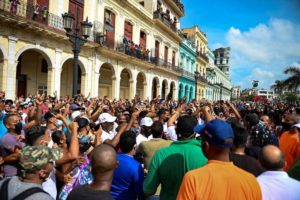On the second day of Kwanzaa, we light a candle for Kujichagulia – self-determination in English – autodeterminación in Spanish.
In this New Year, it is my fervent wish to see the resourceful, highly educated, and civic-minded young people of that lovely Caribbean island, Cuba, allowed to thrive and truly reap the benefits of their dedication to study, to industry, to their country – in other words, to be empowered to practice self-determination – to have the right to vote for their leaders, pursue their dreams.
I first visited Cuba in 1969. I had been a participant in Civil Rights struggles – and eventually, in my impatience with American racism, the Black Power Movement. Even so, I had tried to keep an open mind – I was hopeful: I believed in most Americans’ love of Democracy and Justice. At the time, the Cuban government was still hoping to gain support from representative Civil Rights and Anti-war activists in America. A program designated the Brigada Venceremos offered young Americans and Canadians opportunities to spend 3 months on the island living and working with Cuban students in cane fields and citrus orchards.
I boarded a ship from Canada to Cuba with 200 curious North Americans and went to work picking oranges and grapefruits. In return for 8 weeks of labor, we spent time socializing and touring the island with our Cuban counterparts – learning about the history and goals of the Revolution. What impressed me most of everything I experienced that summer was the exuberance, the dedication, the faith of the young Cubans we came to know. For the most part, they believed in the Revolution, and they were committed to doing their parts so that it would succeed. They wanted a better life for all Cubans.
The two greatest achievements of the Cuban government, obvious to any visitor, even less than ten years after the victory of Castro’s forces, were clearly universal healthcare and universal education, accepted as human rights. Young Cubans were dead-set on taking advantage of educational opportunities – they saw it as the key to that better life.
I traveled to the island again in 2001, 2006 and 2008. Each time, I was again impressed in the same way – regardless of what else was going on, Cubans, in general, were well educated, resourceful, interested, not only in Cuban affairs, but in the world.
I met Cuban students who had traveled to other countries to learn another language – all of them study English, by the way – or who spent time in other countries teaching medicine. I’ve met engineers who made extremely low wages working at government jobs – but earned a living repairing/remodeling ancient cars and using them to take tourists on tours. Cuban doctors and teachers, scientists, are also dance instructors, musicians, tour guides, restaurateurs – all about tapping into additional income related to the hospitality industry. These are all capable, multi-talented people who may be lost to Cuba under present governmental restrictions.
It’s time.

The Cuban Revolution is over 70-years-old now – whatever benefits its citizens have enjoyed from the “social safety net”, have been badly blunted, because its highly educated and community-oriented citizens have not enjoyed basic freedoms, including the act of choosing their leaders. This is a recipe for failure – lack of growth, loss of hope, loss of trust.
It’s past time!

